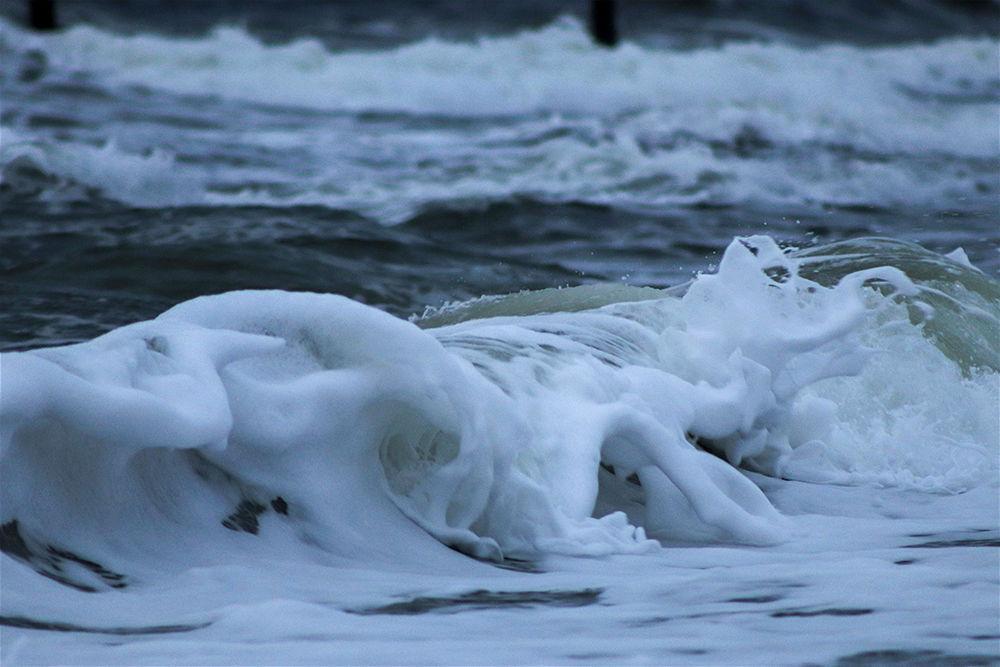Genevive Gholizadeh, a graduate student in industrial design and an aspiring sneaker designer, has been working to produce recyclable running shoes using beach trash from the North Carolina coastline. Her project is called “From Shore to Shoes.”
“I did a lot of research about the beach and about ocean plastic, and I thought it would be a beautiful cycle if I collected plastic from the beach and then made running shoes people would be able to wear while running at the beach,” Gholizadeh said.
A $5,000 grant from Women in Sports Tech made Gholizadeh’s project possible. Gholizadeh applied and sent a proposal for her project. The proposal consisted of online research, on-site research, digital modeling and, finally, fabrication of the running shoe.
She received the grant in May 2020 and plans to have her first batch of recyclable shoes ready by August 2021.
According to Gholizadeh, the fashion industry is one of the most polluting industries, and companies often exhaust resources and drain harmful chemicals into the ocean.
“Unfortunately, a lot of different components contribute to the fashion industry’s pollution,” Gholizadeh said. “Footwear makes up for about one-fifth of that impact. A lot of shoes are not recyclable and end up being taken to a landfill. If room at the landfill is running out, they will often be burned, emitting harmful toxins into the atmosphere.”
Gholizadeh said her shoes will be recyclable to prevent them from ending up in landfills and polluting the atmosphere.
“When the customer is done with our shoes, we will have a recycling program in place so that the customer can return the shoes and they can be upcycled into a new pair of shoes,” Gholizadeh said.
Although the project can collect trash from any region, Gholizadeh has specifically chosen to use trash from North Carolina beaches because she is a North Carolina native. Working with the North Carolina Coastal Federation, an organization that organizes beach cleanups, Gholizadeh can collect trash materials for her project.
“People don’t realize that trash on the side of the highway will ultimately end up on the beach or in the ocean,” Gholizadeh said.
After the trash is collected, it is washed, flaked and pelletized.
“The pellets will then be extruded into a yarn and woven to form the upper part of the shoe, or the pellets will be extruded into a filament and then 3D-printed to form the midsole of the shoe,” Gholizadeh said.
Gretchen Reeves, executive director of Women in Sports Tech, assisted in selecting the women who received the Women in Sports Tech grants this past May. She stated Gholizadeh’s project was very compelling and since the sports technology industry is male-dominated, she wants to provide women with opportunities in the field is the first step to change the gender ratio in the industry.
“The entire purpose of Women in Sports Tech is to support young women interested in or already working in the sports tech industry,” Reeves said. “[The industry] is 95% male, many of whom are in controlling positions. The primary focus is for women and men to work together.”
Even though Women in Sports Tech is a young foundation, it was able to give grants to 15 different women, including Gholizadeh, pursuing research or careers in the sports technology industry in May 2020.
“There aren’t that many women that have been in this industry, and there are not that many women that have known about it, so we started the grant to give women an opportunity to get an internship to launch a potential career in sports tech,” Reeves said.
This year, a fellowship with Women in Sports Tech includes the $5,000 grant and individual mentorship. Recipients will also complete mid- and post-project reviews and are encouraged to attend biweekly Zoom calls in order to engage in networking among the sports technology community.
Although its main purpose is to give research grants to students such as Gholizadeh, Women in Sports Tech recently launched Next Gen, a program to motivate young women in middle and high school to take STEM classes and play sports.
“We try to educate people about what sports tech is, encourage them to be interested, help them develop the skills they will need to be successful in the industry and create a network of people who are interested in supporting them,” Reeves said.
When deciding which candidates to give a grant or internship to, the Women in Sports Tech panel members look at the overall character of a candidate. They are looking for well-rounded candidates who are passionate about sports tech, according to Reeves.
“Genevieve’s design aesthetic is very clear, from her incredible presentation to her creative piece, she is very authentic,” Reeves said. “Her idea is incredible. We all believe in trying to make the world a better place, not only through working towards gender equality, but through caring about the planet.”
Gholizadeh said she already has a marketing campaign plan underway.
“My shoes are going to be running shoes, but essentially, people could run in them or just wear them everyday,” Gholizadeh said. “I want to be able to release them to students at NC State. That way, I can get feedback directly from the students while on campus.”








